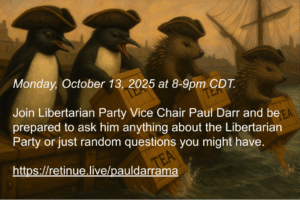The Libertarian movement in the United States is not a monolith. It is an ecosystem made up of distinct but interrelated constituencies, each with its own motivations, behaviors, and expectations. Effective strategic planning begins with understanding the differences among these groups: Libertarian voters, Libertarian Party members, Libertarian activists, and Libertarian-aligned donors who may not belong to either of the first three categories. While these constituencies overlap substantially, they are not interchangeable. Each requires a different form of outreach, engagement, and support to draw them further into the organization.
Libertarian Voters
Libertarian voters represent the broadest circle in the political ecosystem. These individuals express their ideological alignment primarily through electoral behavior. They may cast ballots for Libertarian candidates, support ballot initiatives that limit government power, or split their votes across parties based on issue alignment.
Characteristics include:
High ideological diversity within the broader liberty spectrum.
Limited time for political involvement.
Often distrustful of formal political organizations.
Motivated more by policy impact than party identity.
Many Libertarian voters are philosophically aligned but not organizationally connected. They may not follow internal party developments, and few regularly engage with state or county affiliates. Their engagement tends to be transactional: they support candidates or causes when those efforts align with their personal priorities.
Libertarian Party Members
Party members form a narrower but more committed group. These individuals take an affirmative step to join the Libertarian Party, often paying dues or signing a pledge.
Distinctive attributes include:
Organizational loyalty and continuity of engagement.
Interest in governance, policymaking, and party development.
Higher receptivity to messaging that emphasizes infrastructure, accountability, and growth.
Greater stability in participation across election cycles.
Membership typically reflects a stronger identification with the Party as an institution rather than with libertarianism as a purely philosophical concept. However, not all members are active; many participate primarily through dues and occasional convention attendance.
Libertarian Activists
Activists constitute the smallest but most energetic segment. These individuals volunteer regularly, petition, canvass, run events, serve on committees, or seek elected office.
Activist traits include:
High time and energy investment.
Strong internal networks and relationships.
Movement-centered identity that extends beyond electoral politics.
Intense commitment to the mission of building liberty through sustained action.
Activists are regularly the bridge between casual supporters and deeper organizational involvement. However, activism intensity varies, and burnout risk is substantial. Their needs differ from those of voters or passive members, requiring consistent support, recognition, and leadership opportunities.
Libertarian Donors Who Are Not Members or Voters
A less discussed but strategically important group is Libertarian-oriented donors who may not vote Libertarian or join the Party. These donors often behave like investors funding a cause rather than participants in a political organization.
They may include:
Individuals who support liberty-related legal challenges, think tanks, or single-issue campaigns.
Donors who prioritize policy impact rather than party loyalty.
Supporters who value ideological outcomes without wanting direct involvement in internal processes.
This group may be substantial in size but largely invisible unless properly cultivated. Their contribution patterns follow philanthropic logic more than partisan engagement.
How These Groups Overlap
The intersections among these groups form the operational core of the Libertarian movement.
Voter-Member Overlap: Some members vote Libertarian consistently, but many Libertarian voters are not members.
Member-Activist Overlap: Many activists are dues-paying members, though some activists participate without formal membership.
Voter-Activist Overlap: Activists almost always vote Libertarian, though not all Libertarian voters have the time or capacity to become activists.
Donor Overlaps: Donors may overlap with any of the groups, but a significant number sit outside all three categories.
The smallest overlap, where all these groups converge, represents individuals who vote Libertarian, pay dues, volunteer, and donate. These individuals form the backbone of sustained organizational capacity, but they are only a fraction of the overall liberty-aligned population.
Where These Groups Diverge
The differences matter because strategic assumptions often blur these categories, leading to weak recruitment, muddled messaging, and misallocated resources.
Voters may be ideologically aligned but organizationally disconnected. They need simple, policy-focused outreach.
Members may not be activists. They require structured on-ramps and meaningful ways to participate.
Activists may not be donors. Their primary contribution is time, not funding.
Donors may not vote Libertarian. Their participation is mission-driven rather than electorally motivated.
Understanding these divergences is critical to designing a scalable organizational strategy.
Tailoring Targeting and Engagement Strategies
Each constituency responds to different forms of messaging, incentives, and organizational pathways.
Engaging Libertarian Voters
Best approaches include:
Issue-based campaigns tied to real local or national concerns.
Clear contrasts with major-party policies.
Low-friction calls to action such as signing a petition or joining a mailing list.
Messaging focused on impact rather than internal processes.
Voters need a narrative about why Libertarian candidates matter, not a deep dive into committee structures.
Converting Voters into Party Members
Membership-focused outreach should emphasize:
Organizational credibility and transparency.
Tangible benefits such as influence, representation, and shaping the platform or bylaws.
A clear explanation of how dues sustain ballot access, infrastructure, and candidate support.
The objective is to shift supporters from passive ideological alignment to active institutional alignment.
Developing Libertarian Activists
Successful activist recruitment requires:
Personalized invitations.
Peer mentorship and integration into local teams.
Leadership development pipelines.
Appreciation, community, and recognition.
Activists thrive in environments where their contributions are visible and meaningful.
Engaging Libertarian Donors Outside the Membership Base
Donor engagement is most effective when it mirrors nonprofit fundraising:
Highlighting measurable outcomes and strategic priorities.
Offering structured giving programs.
Demonstrating organizational stewardship and transparency.
Avoiding assumptions that donors must become members or voters.
These donors want results, not meetings.
Conclusion
The Libertarian ecosystem is diverse, multilevel, and often misunderstood. Voters, members, activists, and donors each play distinct roles in the movement’s strength and sustainability. Only by recognizing their differences, appreciating their overlaps, and tailoring outreach accordingly can the Libertarian Party build an effective, durable, and scalable organization.



